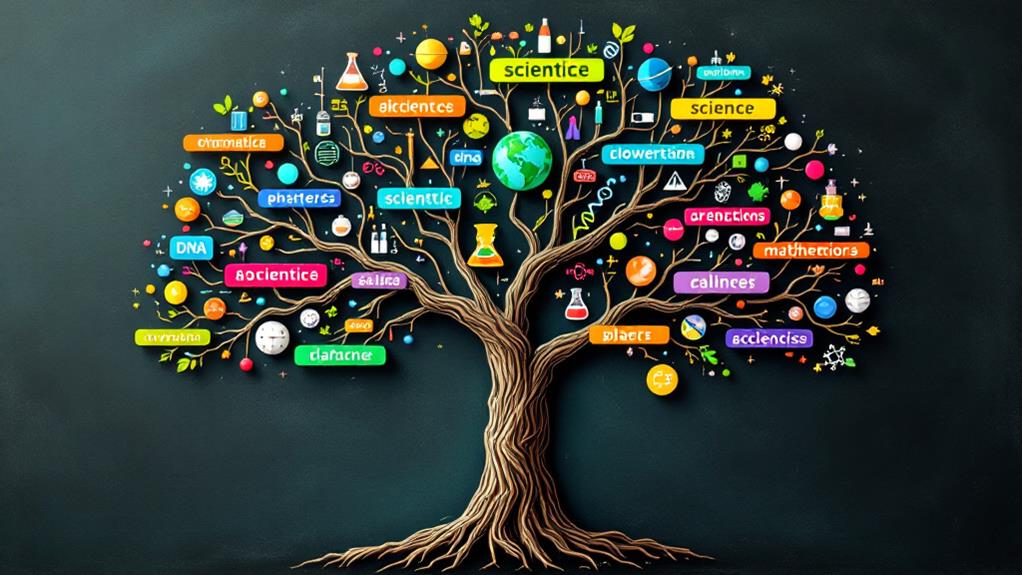What Are the Main Fields of Science? A Beginner's Guide

You're about to investigate the main fields of science, each offering fascinating insights into different aspects of our world. Start with biology, which focuses on life, from cells to ecosystems. Chemistry reveals the magic of atoms and molecules interacting. Physics helps you understand forces, energy, and the universe's fundamental laws. Earth sciences give a peek into the planet's inner workings and its changing climate. Social sciences examine human behavior and societies. Astronomy opens up the cosmos, while environmental science emphasizes sustainability. Each field is interconnected, and as you uncover these landscapes, there's always more to find.
Understanding Biology
When you investigate understanding biology, you begin examining the intricate web of life. You're immersing yourself in genetic research, where you reveal the secrets of DNA and how it dictates the traits of organisms. This expedition also leads you through the fascinating world of cellular processes, uncovering how cells function and communicate. Microbiology techniques become your tools as you study microorganisms and their roles in both health and disease.
By analyzing evolutionary theories, you grasp how species adapt and change over time, shaping the diversity of life on Earth. You'll probe into ecological interactions, understanding how organisms coexist and impact each other and their environments. Biochemistry fundamentals connect you to the chemical processes that sustain life, while anatomical studies offer insights into the structure and function of living beings.
Your investigation includes biodiversity assessment, which measures the variety of life forms and their significance to ecosystems. This knowledge equips you to appreciate the complexity and interconnectedness of life. Each revelation in biology brings you closer to understanding the delicate balance that sustains our planet's rich tapestry of life. Through these inquiries, you reveal the remarkable intricacies that define living organisms.
Exploring Chemistry
As you shift your focus from the lively tapestry of biology to the foundational science of chemistry, you'll reveal the fundamental principles that govern matter and its interactions. Chemistry investigates the domain of atoms and molecules, where chemical bonding determines the structure and behavior of substances. By understanding these molecular structures, you can predict how different elements will interact during organic reactions.
The periodic table becomes your roadmap, guiding you through the characteristics and relationships between elements. You'll learn to use stoichiometry concepts to balance chemical equations and calculate reactant and product quantities. Mastery of these principles is vital for examining the vast possibilities within chemical reactions.
In the lab, you'll apply diverse laboratory techniques to conduct experiments and analyze results. Analytical chemistry, for instance, allows you to determine the composition of substances and understand their properties. This field is significant for developing new materials and solving complex problems.
Moreover, chemistry's role in biochemistry applications bridges the gap between chemistry and biology. You'll investigate how chemical principles underpin biological processes, enhancing your understanding of life itself. By immersing yourself in chemistry, you're opening doors to a world of scientific revelation and innovation.
The Basics of Physics

Physics, often described as the bedrock of natural sciences, provides you with a framework to understand the universe's fundamental laws. By investigating classical mechanics, you grasp how objects move and interact under diverse forces. This foundational knowledge extends into other areas like fluid dynamics, where you study how liquids and gases behave. Probe into thermodynamics to comprehend energy transfer and the principles governing heat and work.
Electromagnetism reveals the mysteries of electric and magnetic fields, explaining phenomena from lightning to the operation of your smartphone. When you venture into quantum mechanics, you encounter the bizarre and fascinating world of subatomic particles, where the rules of classical mechanics no longer apply. In particle physics, you examine these tiny constituents of matter, seeking to uncover the universe's most basic building blocks.
Astrophysics broadens your perspective, allowing you to understand celestial bodies and cosmic phenomena, from stars to black holes. Wave theory helps you analyze different types of waves, including sound and light, providing insights into communication technologies and optics. By mastering these concepts, you can appreciate the intricate tapestry that forms the universe's fabric, gaining deeper insights into the world around you.
Earth Sciences Overview
Earth sciences, encompassing a diverse range of fields, investigate the planet we call home. By studying geological formations, you can uncover the history etched in rocks and landscapes. Plate tectonics, for instance, explains the movement of Earth's lithosphere, causing earthquakes and creating mountains. Understanding these dynamics is essential for predicting natural events and mitigating their impacts.
Climate change is another significant aspect of earth sciences, as it examines the long-term shifts in weather patterns and how they're influenced by human activities. By gaining insights into this field, you can better appreciate the delicate balance sustaining life on our planet.
Natural resources, such as minerals, water, and fossil fuels, are also a focus of earth sciences. Mineralogy studies investigate the properties and uses of minerals, while soil composition analysis helps in agriculture and maintaining healthy ecosystems.
Oceanography research reveals fascinating details about the vast oceans covering most of our planet, including marine life and ocean currents. Finally, atmospheric science examines the layers of gases surrounding Earth, contributing to weather forecasting and understanding atmospheric phenomena. By studying these areas, you appreciate the intricacies of Earth and its systems.
Unraveling Social Sciences

When you investigate the social sciences, you access the complexities of human behavior and societal structures. By immersing yourself in this field, you'll uncover how psychological theories illuminate individual and group behavior. Understanding sociocultural influences becomes crucial as you see how culture shapes interactions and societal norms. Social sciences also encompass economic models that explain how resources are allocated and the effects of market behaviors on communities.
In political systems, you'll analyze how power and governance impact societies. Anthropological studies provide insights into human evolution, cultural diversity, and the shared aspects of human life. Behavioral research helps identify patterns in human actions, offering explanations for why people behave the way they do.
As you probe deeper, demographic trends reveal how population changes affect social dynamics and policy-making. These trends can influence everything from urban planning to healthcare services. The pursuit of social justice drives many within this field, working to address inequalities and create fairer societies.
The Role of Astronomy
How does astronomy shape our understanding of the universe? It opens up a window to cosmic evolution, letting you investigate how galaxies, stars, and planets form and evolve. By studying astronomical phenomena, you're able to comprehend events like supernovae, black holes, and the birth of stars, which broaden your knowledge of the universe's vastness. Astronomy's insights into planetary science help you learn about the composition and behavior of planets both in our solar system and beyond.
To make the most of astronomy, consider these significant aspects:
- Celestial Navigation: Mastering this helps you understand how ancient civilizations used stars to navigate, offering a historical perspective on astronomy's practical applications.
- Telescope Technology: Advances in this area allow you to see further and more clearly into space, transforming your stargazing techniques and broadening your observational capabilities.
- Stargazing Techniques: Learning these can improve your ability to identify constellations and celestial bodies, connecting you more deeply with the night sky.
- Planetary Science: Engaging in this field helps you answer questions about the origins and conditions of planets, providing clues to life's potential elsewhere in the cosmos.
Astronomy is truly a gateway to understanding your place in the universe.
Delving Into Environmental Science

While astronomy expands your understanding of the universe, environmental science grounds you in the complexities of our own planet. You'll investigate how sustainability practices can help reduce our ecological footprints, ensuring that future generations inherit a thriving Earth. Understanding ecosystem dynamics is essential; it allows you to see how different species interact and depend on each other, highlighting the importance of biodiversity conservation.
In tackling climate change, you'll learn about the role of renewable resources, such as solar and wind energy, in reducing greenhouse gas emissions. Environmental science also involves developing effective conservation strategies to protect endangered species and habitats. These strategies are critical for maintaining ecological balance and preventing the loss of biodiversity.
Environmental policy plays a key role in shaping the actions and regulations that govern our interaction with the environment. By studying environmental science, you can contribute to crafting policies that promote sustainable development and protect natural resources. Your work in this field will help address pressing global issues, ensuring that human activities align with the planet's capacity to support life. Embracing this scientific field empowers you to make informed decisions for a sustainable future.
Importance of Interdisciplinary Studies
Interdisciplinarity fosters innovation by merging insights from distinct fields to tackle complex issues. By engaging in collaborative research, you can draw upon the strengths of multiple scientific domains, which improves problem-solving capabilities. This approach encourages the development of scientific literacy, allowing you to understand and communicate complex ideas effectively. Embracing interdisciplinary studies opens doors to novel solutions and breakthroughs that single-discipline approaches might miss.
Here are four significant benefits of interdisciplinary studies:
- Improved Problem Solving: By combining methodologies and perspectives from different fields, you can address problems more exhaustively and creatively.
- Broader Knowledge Base: Interdisciplinary studies provide a wider understanding of multiple disciplines, increasing your scientific literacy and adaptability.
- Innovative Solutions: Exposure to diverse approaches and technologies can lead to breakthroughs that are not possible within the confines of one field.
- Enhanced Collaboration: Working across disciplines teaches you to collaborate effectively with experts from different areas, fostering a more inclusive research environment.



